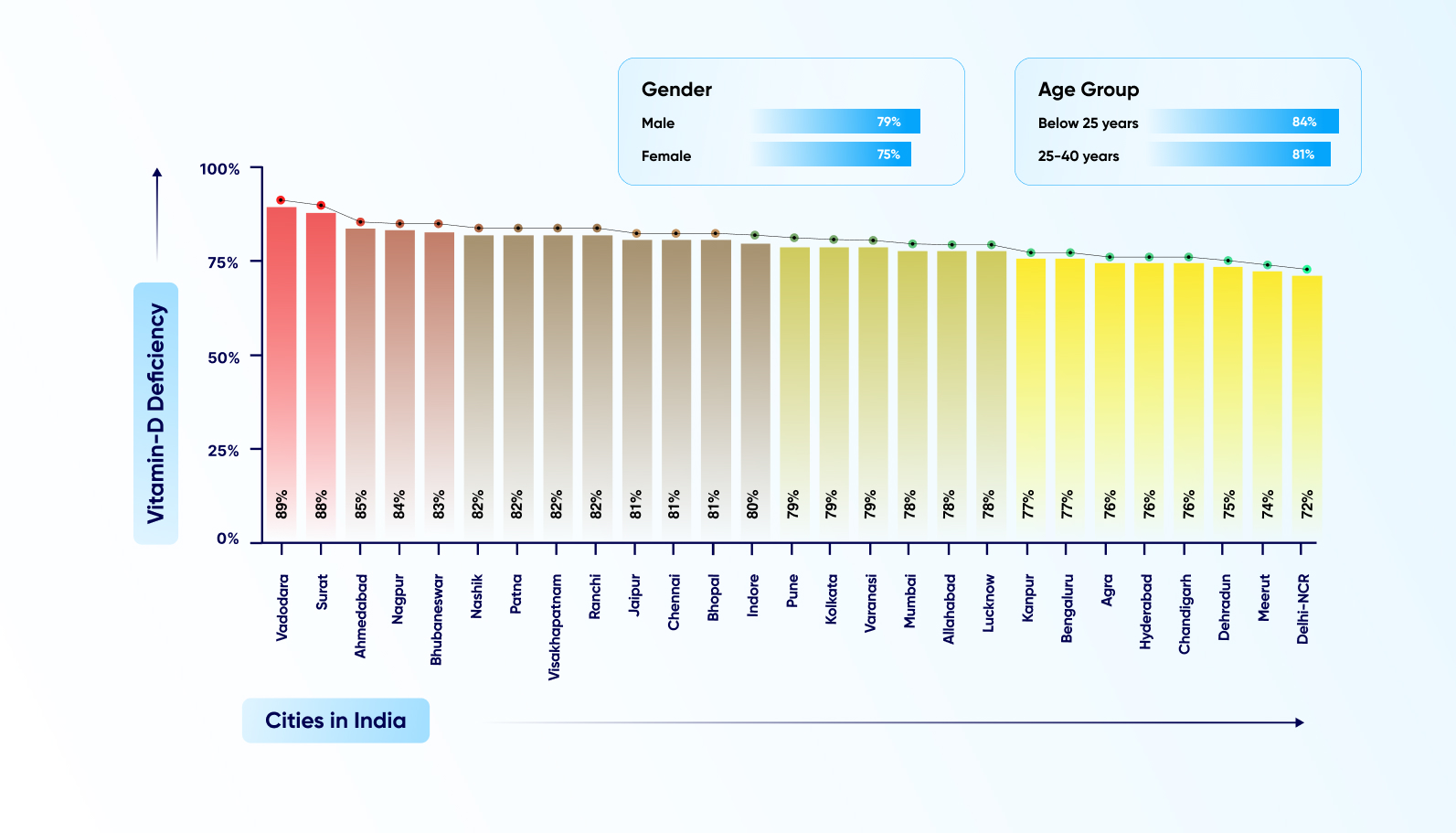
This article delves into Vitamin D supplements, discussing their types, benefits, and the Indian consumption landscape. This detailed blog will help you in choosing the right vitamin D supplements, this article is your comprehensive guide to maintaining adequate Vitamin D levels without compromising on your health.
Vitamin D is crucial for good health and earns its nickname, the “sunshine vitamin,” as our skin synthesizes it when exposed to early morning sunlight for 10-15 minutes. However, people avoid direct sun exposure due to concerns like skin cancer which may lead to Vitamin-D deficiencies. If sun exposure and Vitamin-D rich dietary intake aren’t sufficient, you need to opt for Vitamin-D supplements to manage its deficiency. Yet, excessive supplement intake can put you at risk.
What are the optimal blood levels & daily requirements of vitamin D? How can you determine Vitamin D level?
Vitamin D is stored as 25(OH)-D in the body, and physicians assess its levels by measuring 25(OH)-D in the blood.
The NIH specifies the following levels in the below Table 1 and 2 [1]:


What if you overdose on Vitamin D?
Excessive vitamin D intake, stored in the body, can result in toxicity. While 600 IU from diet and sunlight is generally considered safe, overdosing on supplements may pose some risks. Overdosing symptoms, like nausea, vomiting, weakness, and dehydration, may arise from prolonged high-dose intake, often exceeding 10,000 IU daily. Seeking immediate medical help for these signs is vital. Severe cases may lead to hypercalcemia, impacting the heart, kidneys, and blood vessels, potentially resulting in death. To avoid complications, stick to a maximum of 4,000 IU per day [7].
Vitamin D consumption in India
A study by Tata 1mg Labs revealed that 76% of Indians (3 out of 4), based on tests conducted across 27 cities involving over 2.2 lakh individuals, suffer from vitamin D deficiency. Notably, the most affected group is young adults under 25 years old [2].
Table 3: All-India data on Vitamin D levels between March-August 2022 [2]:

Why do people need a Vitamin D supplement?
Certain groups, like vegans, face higher risks of low vitamin D levels due to their dietary choices. Vegans often have lower vitamin D levels as they avoid rich sources of vitamin D like meat, fish, egg yolks, and fortified dairy, showing a 34% lower serum concentration than meat and dairy consumers [3]. To supplement, plant-based milk alternatives—soy, oats, almond milk—are fortified with vitamin D, offering about 100 IU per cup [1], helping vegans to compensate for this deficiency.
Individuals with obesity may especially benefit from supplementation. Wondering why? Obese people tend to have lesser vitamin D levels in their blood since it gets accumulated in their excess fat tissues, making it harder to utilise for bodily functions [4]. Some research even proposes personalized vitamin D recommendations based on body weight rather than a universal 600 IU dosage [5].
Older individuals are at risk due to reduced efficiency in synthesizing vitamin D from food or sunlight as they age. Spending more time indoors and age-related decline in vitamin D synthesis contribute to this heightened risk among older populations [6].
Understanding these factors helps tailor strategies to address vitamin D deficiencies among various groups, emphasizing the importance of personalized approaches for adequate intake.
Things to keep in mind before consuming Vitamin D supplements
- When considering vitamin D supplements, consulting a healthcare professional remains the best course of action to determine the most suitable option for individual needs. It’s crucial to disclose any ongoing medications, as some medications might interact with supplements. Make sure to inform your healthcare professional about the use of steroids, cholesterol-lowering statins, weight-loss drugs, and diuretics.
- Certain medical conditions can heighten the body’s requirement for vitamin D. Inform your doctor if you have conditions such as alcoholism, intestinal diseases like Crohn’s or celiac, kidney or liver diseases, overactive parathyroid glands, pancreatic disease, or have undergone stomach or small bowel surgeries.
- Taking vitamin D at any time of the day is acceptable, but consistency is key in preventing deficiency. To optimize absorption, pairing it with your largest meal of the day is recommended. Studies suggest that doing so can increase blood vitamin D levels by around 50 percent [8].
- If a dose gets skipped, you don’t have to double up. Simply take it when you remember or wait until the next scheduled dose. Vitamin D supplements typically come in gel capsules, chewable tablets, liquids, or drops, and taking them once daily is sufficient; there is no evidence of incremental benefits from taking multiple doses.
- Avoid taking these supplements on an empty stomach or between meals, as it may affect absorption. Individuals with digestive problems should consult their doctor before supplement intake.
- While taking vitamin D supplements with the largest meal of your day is optimal, they can also be taken with milk (milk contains magnesium which helps in absorption of fat-soluble vitamins).
- Vitamin D comes in two forms – D2 and D3, and both function similarly in the body. However, research indicates that D3 might elevate blood levels slightly more and have a longer duration of action.
- Last but not the least, monitor your vitamin D levels regularly to assess how much you should take or how well your body absorbs it.
By adhering to the above-listed guidelines and seeking professional advice, individuals can navigate vitamin D supplementation effectively, optimizing absorption and avoiding potential complications.
Choosing the right Vitamin D Supplements
Choosing the right vitamin D supplements plays a significant role in maintaining optimal levels of this essential nutrient. So, take a look at the following considerations that can help you in making an informed choice:
- Vitamin D Form: There are basically two main types of vitamin D: D2 (ergocalciferol) and D3 (cholecalciferol). Opt for D3 as it’s more effective in elevating and sustaining vitamin D levels.
- Third-party Testing: Ensure the supplement undergoes third-party testing like for quality and purity. Third-party platforms like Unbox Health can help you choose the right supplement based on product quality ratings. Additionally, certifications from reputable bodies like FSSAI, NSF International, or USP also enhance reliability.
- Quality and Purity: Opt for supplements from GMP-following manufacturers, emphasizing products that are free from contaminants. Third-party certifications also add assurance here.
- Dosage Strength: Dosage varies based on age, health, and existing vitamin D levels as mentioned in Tables 1 and 2. Consulting a healthcare professional is wise for determining the right dosage.
- Additional Ingredients: Scrutinize supplement ingredients for fillers, preservatives, or allergens. Choose those that contain minimal additives and are aligned with your dietary preferences.
- Bioavailability: As vitamin D is fat-soluble, it must be consumed in combination with fats to be absorbed. Hence, select vitamin D supplements are formulated with healthy fats to enhance their bioavailability.
- Reputable Brands: Prioritize renowned brands with sound manufacturing practices and positive reviews to ensure quality products when choosing Vitamin D supplements.
- Formulation and Delivery: Consider supplement forms—capsules, tablets, gummies, or liquid drops—that align with your routine and preferences.
- Cost vs. Value: Balancing price and quality is vital. Prioritize effectiveness and quality over solely considering lower costs.
- Consultation: For specific health concerns or medications, consulting a healthcare professional before supplement intake is advisable.
While supplements offer support, obtaining vitamin D naturally through sunlight and a balanced diet remains crucial. Regular monitoring via blood tests is an effective way to track vitamin D levels and assess your needs for supplement consumption.
Unbox Health is a ratings platform for packaged foods and health supplements. In an industry clouded by misinformation, manipulation, and marketing tricks, we provide lab-tested facts and zero opinions.
Among other categories, we lab test vitamin D supplements for label accuracy and safety parameters via our partner network of NABL-accredited and FSSAI-certified labs.
Make smarter consumption choices.
References
- https://ods.od.nih.gov/factsheets/VitaminD-HealthProfessional/
- Nearly 76% Of Indian Population Suffers Vitamin D Deficiency: Tata 1mg Labs Data. (2023, January 28). Business World, NA. https://link.gale.com/apps/doc/A734977514/HRCA?u=anon~4e9c8025&sid=sitemap&xid=70225742
- https://www.ncbi.nlm.nih.gov/pmc/articles/PMC4739591/
- https://www.ncbi.nlm.nih.gov/pmc/articles/PMC3705328/
- https://onlinelibrary.wiley.com/doi/full/10.1038/oby.2011.404
- https://www.ncbi.nlm.nih.gov/pmc/articles/PMC3501367/
- https://www.ncbi.nlm.nih.gov/pmc/articles/PMC5587346/
- https://pubmed.ncbi.nlm.nih.gov/20200983/
